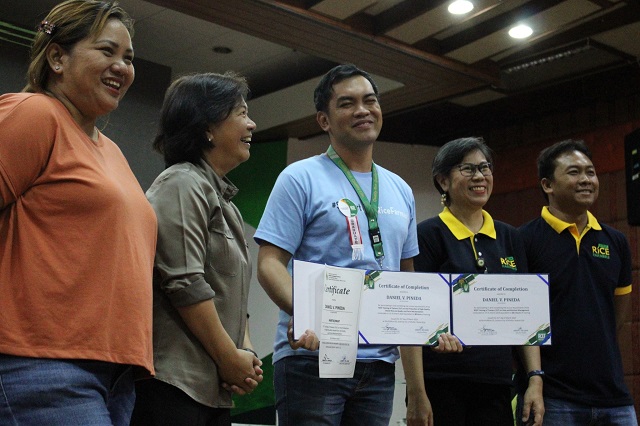
Before, there was boredom. Now, pure excitement fills Daniel V. Pineda as he embarks on a journey of continuous learning and growth after participating in the Rice Competitiveness Enhancement Fund (RCEF) training.
A “lost son” in agriculture, Daniel, who is from Gabaldon, Nueva Ecija, only pursued agriculture to fulfill his mother’s dream. His mother was employed in the municipal agriculture office in Gabaldon while his father was a farmer.
Upon graduating in 2008, Daniel followed a different path, enrolling in culinary arts in San Pedro, Laguna, and later venturing into online business. He eventually became a successful insurance agent until the COVID-19 pandemic impacted his work, prompting him to return to Nueva Ecija in 2021.
“I was bored then so I accepted a friend’s invitation to join a training at the Jerry Farm Integrated in Laur, Nueva Ecija,” he recalled.
To his surprise, Daniel was selected in the Farmer Field School to be trained on producing high-quality inbred seeds under RCEF in 2022.
The training gained significant importance for Daniel when his father unexpectedly passed away, leaving 15-ha land. They had to lease the land to rice and onion growers, and Daniel regretted not valuing agriculture earlier. However, with RCEF, his interest in farming was restored, and he emerged even more passionate than before.
“The training has been a turning point for my farming journey, which had been long delayed. I caught up with modern techniques, learning about PalayCheck, which serves as my guiding principles,” he said.
During the RCEF training, Daniel discovered that farming could be made easier with the use of modern machines and techniques, in stark contrast to his father’s laborious manual practices.
Among these machines is the four-wheel tractor that aids in faster land preparation and is good for dry land tillage while the combine harvester could harvest 3-4ha of rice field in a day and could reduce labor costs.
He also learned about modern transplanting practices such as modified dapog technique, which could transplant rice seedlings within 10-14 days saving up to 10-15% in seedling costs and the recommended 20x20cm planting distance.
On fertilizer application, he learned to use the Leaf Color Chart and the Minus-one-element Technique to monitor the needed nutrients of the rice crop and its soil such as nitrogen, phosphorus, potassium, zinc, and sulfur.
He can now also identify beneficial organisms such as lady beetle, tachinid fly, and dragonfly from pests, which include stem borer, rice black bug, and brown planthopper.
Beyond gaining knowledge, the training also motivated him to share his learnings with fellow farmers, helping them improve their harvests and increase their income.
“There’s beauty in farming that I was only able to appreciate during our training. It’s not too late for me to return to farming and make the most of it,” he said.
Now back home, rice farming has become his sanctuary — a center of self-discovery and newfound passion. Through RCEF, Daniel has rekindled his connection with the land, embracing farming not just as a profession but as a way of life filled with purpose and fulfillment.




